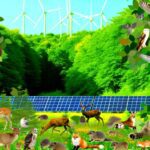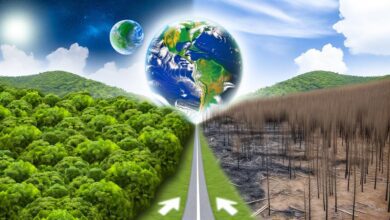Have you ever stopped to wonder how your dinner plate might be contributing to climate change? As you navigate your daily dietary decisions, it's critical to understand that what you eat isn't just influencing your health, it's also impacting the health of our planet. From the steak sizzling on your grill to the apple in your lunchbox, your food choices have a significant bearing on greenhouse gas emissions, deforestation, and water use. You're in a position to make a difference, and it starts with understanding how your diet affects the environment. But how exactly does your food intake relate to climate change? And what are the best ways to modify your diet for a healthier planet? Let's explore these pressing questions together.
Key Takeaways
- Animal-based foods, particularly red meat, dairy, and farmed shrimp, have high greenhouse gas emissions and contribute significantly to climate change.
- Plant-based diets have a lower carbon footprint compared to diets rich in animal products, making them a more sustainable choice for reducing greenhouse gas emissions.
- Animal agriculture requires vast amounts of land, leading to deforestation and habitat loss. Shifting towards plant-based diets can help preserve natural habitats and protect biodiversity.
- Producing meat requires significantly more water compared to plant-based foods. By reducing meat consumption and choosing plant-based alternatives, we can contribute to water conservation efforts.
Understanding the Food-Climate Connection
To understand the climate impact of our diet, it's crucial to grasp that every stage of the food cycle, from production to disposal, emits greenhouse gases, with agriculture and land use being the primary culprits. This is the Food-Climate Connection, a critical part of how diet choices impact climate change.
You see, food systems contribute significantly to greenhouse gas emissions. Methane from cattle, nitrous oxide from fertilizers, and carbon dioxide from deforestation all play their part in increasing the carbon footprint of our food. Reducing these emissions is not just about sustainable farming practices, it's also about the foods we choose to consume.
Consider the meat in your diet. Animal-based foods, especially red meat, dairy, and farmed shrimp, have high food-related emissions. Compare this to plant-based foods, which typically have a much lower impact. By understanding the food-climate connection, you can make diet choices that are healthier for you and the planet.
In short, shifting towards a plant-rich diet and reducing food waste can significantly decrease food-related emissions, help mitigate climate change, and create a healthier future for everyone. Your diet choices matter, not just for your own health, but for the health of our world.
Impact of Meat Consumption on Climate
Chewing on that juicy steak, you might not realize that meat and dairy, especially from cows, are responsible for about 14.5% of global greenhouse gas emissions each year, matching the carbon output of all the world's cars, trucks, airplanes, and ships combined. The impact of meat consumption on climate is significant, and it's essential for us to understand how our diet affects climate.
It's not just red meat that's the problem. All animal agriculture contributes to greenhouse gas emissions. Beef and lamb have the highest carbon footprint per gram of protein, while pork and chicken fall somewhere in the middle. Even cheese racks up 5.4 kg of carbon dioxide equivalents for every 50 grams of protein it provides.
But here's where you can make a difference. Eating less meat, particularly red meat, can significantly reduce your climate footprint. A vegan diet, rich in plant-based proteins like tofu, beans, and nuts, comes with a significantly smaller carbon footprint. By adjusting your diet, you're not just serving your health, but also our planet. It's a small change, but it's a start towards a more sustainable future.
The Role of Plant-Based Diets
If you're looking to reduce your climate footprint, embracing a plant-based diet could be a powerful step in the right direction. This switch impacts more than just your health—it's also a crucial part of the mitigation of climate change. However, it doesn't necessarily mean you need to go full vegan. Simply consuming less meat and dairy, particularly red meat, and incorporating more fruits, vegetables, and whole grains can make a significant difference.
| Food Choices | Impact on Climate Change |
|---|---|
| More Meat & Dairy | Increases greenhouse gases |
| More Plant-Based Foods | Reduces greenhouse gases |
| Vegetarian Diet | Significantly reduces food-related footprint |
Consider your sources of protein. Plant-based diets tend to have lower greenhouse gas intensities compared to diets heavy in animal-based foods. Shifting towards more plant proteins and fewer animal-based foods can dramatically cut emissions. Also, reducing dairy consumption can further lessen your food-related footprint. So, if you're serious about serving the planet and its inhabitants, updating your food choices to include more plant-based options could be your next big step.
Food Choices: A Sustainable Approach
Building on the idea of plant-rich diets, it's essential to understand how making sustainable food choices can further help in reducing your environmental footprint. The food you consume greatly impacts climate change, often more than you'd expect.
How so? Food production, distribution, and disposal all contribute to emissions. More alarming is the fact that animal-based foods, particularly red meat and dairy, are notorious for high carbon emissions. This is where your diet choices play a pivotal role.
Embracing a sustainable food system and shifting towards plant-rich diets can significantly reduce emissions. You don't have to go vegan overnight, but consciously reducing your intake of red meat and dairy can make a huge difference. For instance, swapping animal protein for plant protein even a few times a week can lower your environmental impact.
It's also crucial to remember that food choices: a sustainable approach, isn't just for the affluent. Lower-income countries also have a role to play in this change. By making mindful food choices, you're not only serving your health but also contributing to a healthier planet. Your diet choices can and do impact climate change – make them count.
Reducing Food Waste for Climate Health
Reducing food waste is a powerful strategy you can adopt to lower greenhouse gas emissions and promote climate health. When you reduce food waste, you're directly combating the climate crisis by cutting back on the methane that rotting food produces in landfills. This simple act serves two purposes: it helps reduce global warming and contributes to food security by making more food available in the system.
Begin with meal planning and proper storage techniques. This not only minimizes waste and lower carbon emissions but also fosters a culture of mindfulness about consumption. Make use of leftovers creatively rather than discarding them. Cutting back on portion sizes can also help in reducing food waste, a small change with lasting climate impacts.
If you have excess food, donate it to local organizations. This not only reduces waste but also serves your local community. Composting is another effective strategy. By composting your food waste, you're transforming it into a resource, helping enrich soil and save millions of metric tons of greenhouse gas emissions.
Transitioning Towards a Vegan Lifestyle
Ready to make a big impact on our planet's health? Gradually incorporating more plant-based meals into your diet is a proactive step towards a vegan lifestyle, a choice that's not only beneficial for your health, but also a powerful ally in the fight against climate change.
Transitioning towards a vegan lifestyle is an act of service to our environment and human health. By reducing your consumption of animal products, you're helping to reduce greenhouse gases. According to the Intergovernmental Panel on Climate, diet choices impact climate change significantly.
Start experimenting with vegetarian recipes, many of which can easily meet your daily grams of protein requirement. Beans, lentils, tofu, and quinoa are excellent sources of plant-based protein.
Educate yourself about the environmental impacts of animal agriculture. The more informed you are, the easier it becomes to make choices that align with your values and commitment to our planet.
Connect with the vegan community for support, shared experiences, and tips. Together, we can make a difference, one meal at a time. By embracing a plant-based diet, you're not just improving your health, but also contributing to a sustainable future.
Frequently Asked Questions
How Does Dietary Choice Impact Climate Change?
Your diet choices greatly impact climate change. Lowering meat consumption and opting for plant-based meals reduces food production emissions. Also, choosing local sourcing and preventing food waste can significantly lessen your environmental footprint.
How Does Our Lifestyle Choices Affect Climate Change?
By choosing sustainable fashion, green transport, and energy efficiency, you're reducing your carbon footprint. Waste reduction, water conservation, using renewable energy, eco-friendly products, sustainable travel, and home gardening also significantly affect climate change positively.
What Is the Best Climate Diet?
You can combat climate change by choosing climate-friendly foods. Embrace plant-based benefits, seasonal eating, and local foods. Minimize meat, focus on ocean conservation diet, and reduce food waste. Your choices make a big difference.
What Is One Way That Your Diet Has an Impact on the Environment?
Your diet impacts the environment through factors like food waste, meat consumption, and packaging waste. Choosing local produce, seasonal foods, and plant-based alternatives can significantly reduce your carbon footprint.







